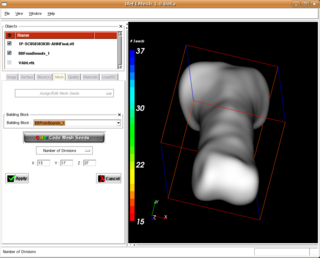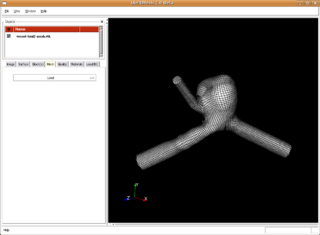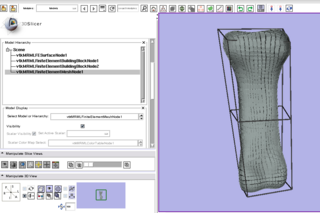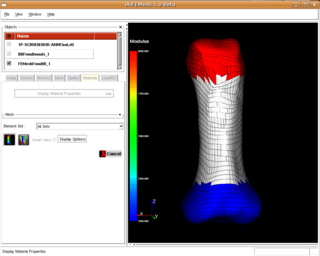NA-MIC/Projects/Collaboration/Slicer3 Theme
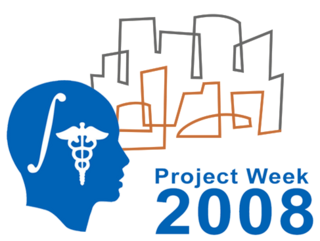 Return to Project Week Main Page |
Key Investigators
- Iowa: Nicole Grosland, Vincent Magnotta, Hans Johnson
Objective
This page describes how to incorporate the Slicer3 Theme into any KWWidgets based application.
Getting the Slicer3 Theme Files
The Slicer3 theme is a clean and nice looking user interface. This page describes how to incroporate the theme into any KWWidgets application.
- The following source code files are needed from the Slicer3 code base. These are located in Slicer3/Base/GUI
- vtkSlicerCheckRadioButtonIcons.cxx vtkSlicerCheckRadioButtonIcons.h
- vtkSlicerFont.cxx vtkSlicerFont.h
- vtkSlicerTheme.cxx vtkSlicerTheme.h
- vtkSlicerColor.cxx vtkSlicerColor.h
- vtkSlicerIcons.cxx vtkSlicerIcons.h
- The following icons are needed. These are located in Slicer3/Base/GUI/Resources. This file needs to be put in a directory called Resources that is in the same directory as vtkSlicerCheckRadioButtonIcons.h
- vtkSlicerCheckRadioButton_ImageData.h
Slicer3 Theme Modifications
Modify vtkSlicerTheme.cxx
- Change line 5 from
#include vtkSlicerApplication.h
to
#include vtkMyApplication.h
- Change line 61 and 108 from
vtkSlicerApplication *app = vtkSlicerApplication::SafeDownCast(this->GetApplication() );
to
vtkKWMyApplication *app = vtkKWMyApplication::SafeDownCast(this->GetApplication() );
Your Application Modifications
In your application class header file should look similar to this
#ifndef __vtkKWMyApplication_h
#define __vtkKWMyApplication_h
#include "vtkKWApplication.h"
#include "vtkKWRegistryHelper.h"
class vtkSlicerTheme;
class vtkKWMyApplication : public vtkKWApplication
{
public:
static vtkKWMyApplication* New();
vtkTypeRevisionMacro(vtkKWMyApplication,vtkKWApplication);
virtual void InstallTheme ( vtkKWTheme *theme );
virtual void InstallDefaultTheme ( );
vtkSlicerTheme *GetSlicerTheme ( );
// Description:
// Set/Get the application font family
void SetApplicationFontFamily ( const char *family);
const char *GetApplicationFontFamily ( ) const;
// Description:
// Set/Get the application font size
void SetApplicationFontSize ( const char *size );
const char *GetApplicationFontSize ( ) const;
.
.
.
protected:
vtkKWMyApplication();
~vtkKWMyApplication();
vtkSlicerTheme *SlicerTheme;
char ApplicationFontSize [vtkKWRegistryHelper::RegistryKeyValueSizeMax];
char ApplicationFontFamily [vtkKWRegistryHelper::RegistryKeyValueSizeMax];
.
.
.
};
In your application class source file should look similar to this
vtkKWMyApplication::vtkKWMimxApplication()
{
vtkKWFrameWithLabel::SetDefaultLabelFontWeightToNormal( );
this->SlicerTheme = vtkSlicerTheme::New ( );
strcpy ( this->ApplicationFontSize, "small" );
strcpy ( this->ApplicationFontFamily, "Arial" );
.
.
.
}
//---------------------------------------------------------------------------
void vtkKWMimxApplication::InstallDefaultTheme ( )
{
InstallTheme( this->SlicerTheme );
}
//---------------------------------------------------------------------------
void vtkKWMimxApplication::InstallTheme ( vtkKWTheme *theme )
{
if ( theme != NULL )
{
if ( vtkSlicerTheme::SafeDownCast (theme) == this->SlicerTheme ) {
this->SetTheme (this->SlicerTheme );
} else {
this->SetTheme ( theme );
}
}
}
//---------------------------------------------------------------------------
vtkSlicerTheme *vtkKWMimxApplication::GetSlicerTheme ( )
{
return this->SlicerTheme;
}
//----------------------------------------------------------------------------
void vtkKWMimxApplication::SetApplicationFontFamily ( const char *font)
{
char localFont[32];
strcpy(localFont, font);
if ( this->SlicerTheme )
{
this->SlicerTheme->SetFontFamily ( localFont );
this->Script ( "font configure %s -family %s", this->SlicerTheme->GetApplicationFont2(), localFont );
this->Script ( "font configure %s -family %s", this->SlicerTheme->GetApplicationFont1(), localFont );
this->Script ( "font configure %s -family %s", this->SlicerTheme->GetApplicationFont0(), localFont );
strcpy ( this->ApplicationFontFamily, localFont );
this->SetRegistryValue(1, "Font", "Family", localFont);
}
}
//----------------------------------------------------------------------------
const char *vtkKWMimxApplication::GetApplicationFontFamily () const
{
return this->ApplicationFontFamily;
}
//----------------------------------------------------------------------------
void vtkKWMimxApplication::SetApplicationFontSize ( const char *size)
{
char localSize[32];
strcpy(localSize, size);
if (this->SlicerTheme)
{
vtkSlicerFont *font = this->SlicerTheme->GetSlicerFonts();
if ( font )
{
// check to see if m has a valid value:
if ( font->IsValidFontSize ( localSize ) )
{
int f2 = font->GetFontSize2( localSize );
int f1 = font->GetFontSize1( localSize );
int f0 = font->GetFontSize0( localSize );
this->Script ( "font configure %s -size %d", this->SlicerTheme->GetApplicationFont2(), f2);
this->Script ( "font configure %s -size %d", this->SlicerTheme->GetApplicationFont1(), f1);
this->Script ( "font configure %s -size %d", this->SlicerTheme->GetApplicationFont0(), f0);
strcpy (this->ApplicationFontSize, localSize );
this->SetRegistryValue(1, "Font", "Size", localSize);
}
}
}
}
//----------------------------------------------------------------------------
const char *vtkKWMimxApplication::GetApplicationFontSize () const
{
return this->ApplicationFontSize;
}
In your main program will need the following lines. You probably already have the first line to create the application. The second line will install the Slicer3 theme for you.
vtkKWMyApplication *app = vtkKWMyApplication::New(); app->InstallDefaultTheme( );
Progress
- Much progress was made adding support for VTK Unstructured Grid datatypes as a subclass of models in Slicer3. Slicer's Model Hierarchy module was modified to include control over unstructured grids. This work is currently in the meshing branch of Slicer, but will be merged into the trunk in the next few weeks, after completing and testing what we developed this week.
- The mesh generation interface has stabilized now that all the desired features for creating meshes have been implemented and partially tested. These new editing functions will be integrated with Slicer and tested during the next few months.
- Several user interface bugs were fixed in mesh generation. Initial support for node and element set definitions have been added.
- Created a initial mesh from an Aneurysm as provided by Luca. Testing also being done on data provided by Adam Wittek.
References
- Grosland NM, Brown TD. A voxel-based formulation for contact finite element analysis. Comput Methods Biomech Biomed Engin. 5(1):21-32, 2002.
- Grosland NM, Bafna R, Magnotta VA. Automated Hexahedral Meshing of Anatomical structures using Deformable Registration. Computer Methods in Biomechanics and Biomedical Engineering. Accepted.
- Grosland NM, Shivanna KH, Magnotta VM, Kallemeyn NA, DeVries NA, Tadepalli SC. IA-FEMesh: An open-source, interactive, multiblock approach to musculoskeletal finite element model development. Submitted.
- P. P. P'ebay and D. C. Thompson and J. Shepherd and P. Knupp and C. Lisle and V. A. Magnotta and N. M. Grosland, New Applications of the Verdict Library for Standardized Mesh Verification. Pre, Post, and End-to-End Processing, Proc. 16th International Meshing Roundtable,Seattle, WA, 2007
Description
The Musculoskeletal Imaging, Modeling, and EXperimentation (MIMX) Program is a collaborative effort directed at computational modeling of anatomic structures. A primary objective is to automate the development of patient-/subject- specific models using a combination of imaging and modeling techniques, with particular emphasis on finite element modeling.
Publications
Links
Project Week Results: Winter 2008, June 2007
